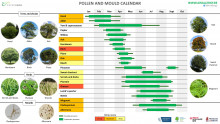In brief
The birch pollen season is gradually coming to an end. Conditions are more favourable for allergic individuals, but caution remains necessary.
Other trees currently in bloom include ash, willow, oak, plane and some members of the Cupressaceae family.







